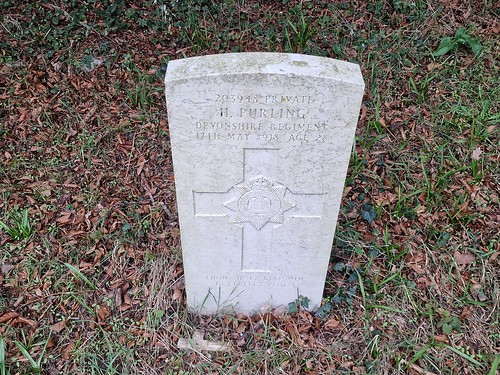Brandon Parva – All Saints Church (Harry Purling)
Richard and I visited All Saints Church in Brandon Parva a couple of weeks ago, but more of that in later posts. This is the war grave of Harry Purling which is located in the graveyard of that church, he died at the age of 28 on 17 May 1918. There’s little more for me to add to what is available on an interesting project in the Group of 15 area as it gives plenty of details about Harry’s life.
In short, Harry was born in the village on 10 July 1889 and was baptised in All Saints Church on 22 September 1889. He was the son of John and Mary Ann and he was one of 12 children, but a later census noted that 7 had died. Listed as being a farm labourer at the 1911 census, during the First World War Harry initially joined the 1st/4th Norfolk Regiment (soldier number 1329) in 1914 and was then transferred to the Devonshire Regiment (soldier number 203948).
His military records don’t appear to have survived, but the war notes show that he died in the UK from pneumonia on 17 May 1918. He appeared to be in the 1/4th Battalion of the Devonshire Regiment which was fighting in the Mesopotamia campaign at that time, not a huge distance away from Baghdad. I’m not an expert in this (or indeed at anything really) but I understand that soldiers often changed regiments at this time as they had been injured and were then sent back out with troops from another area. But without his war record (the majority of records were destroyed in a fire during the Second World War), I’m not sure where Harry spent the First World War, although his medal card (available free from the National Archives) does indicate that he was awarded the Victory Medal and the 1915 Medal, both of which I think required service overseas.
That all means I don’t know where he fought, the destruction of the army records in September 1940 was a huge loss for matters such as this. My very amateurish best guess is that he was sent with the 1/4th Battalion of Norfolk Regiment to Gallipoli where he was injured, returned to the UK and was then sent out to Baghdad before coming back injured. It must have been a grand adventure for someone who was unlikely to have gone far from Brandon Parva where he was born, baptised, lived and worked, but one with a tragic ending. At least for his family his body was returned to the village, where he will forever lie in peace. For reasons I’m unclear about, the stone was replaced in 1980, I assume just because the inscription became unreadable.


